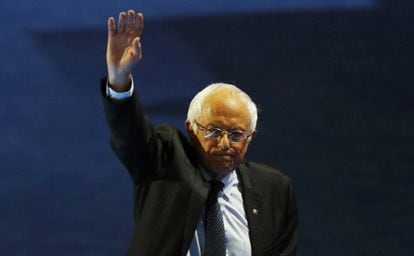Promising to continue the ‘revolution’, Bernie Sanders calls on his supporters to vote for Hillary Clinton
Keynote speakers attempted to close divisions at Democratic Party convention


As the Democratic Party brought one of its most difficult days in recent history to a close, its presidential candidate, Hillary Clinton, finally received the blessing of her erstwhile rival, Bernie Sanders. In a speech before the Democratic National Convention in Philadelphia,Sanders urged his supporters to vote for Clinton, promising that his progressive movement —the political revolution, as he calls it— will go on.
“Based on her ideas and leadership, Hillary Clinton must become the next president of the United States,” he said before listing all the progressive positions Clinton has adopted on issues like education, healthcare, economy and climate change. Sanders’ speech was meant to give the progressives’ blessing to a candidate that many voters consider too much of a centrist and too close to the country’s economic and political elites.
Sanders supporters, some of whom continued to protest even as speakers took the stage, have a long list of grievances
Yet, Sanders also proclaimed: “Together, my friends, we have begun a political revolution to transform America and that revolution – our revolution – continues.”
Despite his call for Democrats to rally behind Clinton, division was the theme of the day. Sanders supporters, some of whom continued to protest even as speakers took the stage, have a long list of grievances. The most recent ones are evidence in the form of internal Democratic National Committee (DNC) emails published by Wikileaks that show how party leaders worked in Clinton’s favor and Clinton’s choice of running mate, Virginia Senator Tim Kaine, a centrist like herself.
Those emails have led to the resignation of DNC Chairwoman Debbie Wasserman Schultz. Sanders’ pro-Clinton speech was yet another step toward reconciliation.
Key arguments:
CLINTON, THE PROGRESSIVE
Sanders’ remarks were a painstaking act of persuasion of his supporters, many of whom flatly reject Clinton’s nomination. The goal was to show that progressive causes would would move backwards if Donald Trump wins and pull those most hostile to Clinton’s candidacy away from the siren call of Trumpism. “Hillary Clinton understands that if someone in America works 40 hours a week, that person should not be living in poverty,” Sanders explained. “She understands that we must raise the minimum wage to a living wage,” the Vermont senator said before listing his former rival’s progressive credentials. Sanders also pointed out changes in the party platform that he and Clinton’s camp negotiated to create one of the most progressive electoral programs in years.
Sanders pointed to changes in the party platform he and Clinton’s camp negotiated to create one of the most progressive electoral programs in years
THE REVOLUTION
For Sanders, supporting a pragmatic like Clinton does not mean giving up the revolution, the progressive movement that galvanized millions of citizens and forced the Democratic Party to lean further left. “Election days come and go,” he said. “But the struggle of the people to create a government which represents all of us and not just the 1 percent – a government based on the principles of economic, social, racial and environmental justice – that struggle continues.” From now on, Sanders and his ideals are part of the fabric of the Democratic Party. Neither the party nor Clinton - if she wins in November - will be able to do without him or those principles.
SANDERS' IDEOLOGY
“This election is not about, and has never been about, Hillary Clinton, or Donald Trump, or Bernie Sanders or any of the other candidates,” the Vermont senator said. It is not about strategy or polls or any of those things the media loves, he added. “This election is about – and must be about – the needs of the American people...ending the 40-year decline of our middle class...ending the grotesque level of income and wealth inequality that we currently experience.”
STRIKING A BALANCE
Sanders tried to denounce the decline of the middle class and the evils of capitalism but he avoided painting the same catastrophic portrait Trump shared at the Republican National Convention last week. Sanders had to distance himself from Republicans’ pessimism without renouncing his vision of America which, in some respects, agrees with Trump’s view. For example, both politicians have spoken about the negative effects of globalization on the working class.
UNITED AT THE PODIUM, DIVIDED IN THE STANDS
Few speakers spoke enthusiastically of Donald Trump in Cleveland last week. And some of the party’s most prominent figures - former presidents and John Kasich, the governor of the state that hosted the convention- did not show up. Ted Cruz, Trump’s fiercest rival in the primaries, was booed off the stage after he delivered a speech that avoided showing any allegiance to the presumptive nominee. There was a clear division at the podium but unity among delegates in the stands. This week Democratic convention speakers are showing strong unity on stage —most speakers extol Clinton’s virtues— even as protestors maintain a chorus of jeers against the candidate. Sanders did not act like Ted Cruz; he simply asked supporters to vote for Clinton.
THE TRUMP ARGUMENT
The recurrent theme at the RNC last week was total rejection of Clinton’s candidacy. “Lock her up,” became the unofficial slogan of the convention. And now Democrats in Philadelphia are focusing on Trump. He is the best argument to make the party close ranks around Clinton. For every point made in Clinton’s favor, Sanders provided a rationale against Trump. “While Donald Trump is busy insulting one group after another, Hillary Clinton understands that our diversity is one of our greatest strengths,” he said. Jenn Powell, a Florida delegate, is rather disappointed. “I think it’s offensive that they need to call attention to Donald Trump in a room full of Democrats. We all know Donald Trump. Who were they speaking to? They could have talked about ideas for the future. I am disappointed that it was a show of ‘oh, how scary is Trump.’”
English version by Dyane Jean-François
More information
Archived In
- Caso emails Hillary Clinton
- Filtración documentos
- Partido Demócrata EE UU
- Ciberespionaje
- FBI
- Hillary Clinton
- Seguridad nacional
- Delitos informáticos
- Policía
- Espionaje
- Privacidad internet
- Partidos políticos
- Defensa
- Fuerzas seguridad
- Seguridad internet
- Internet
- Delitos
- Medios comunicación
- Telecomunicaciones
- Justicia
- Política
- Comunicaciones
- Comunicación
- USA Elections
- Americas












































